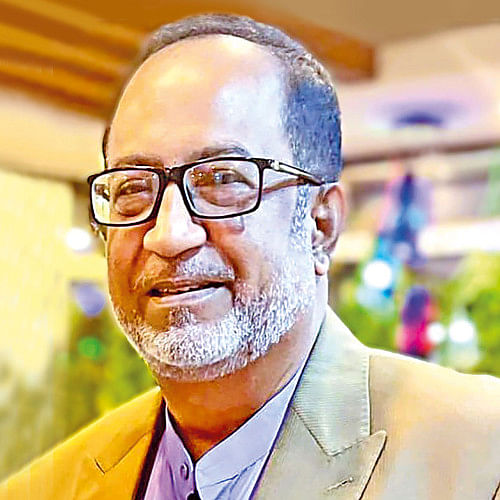In conversation with Advocate AKM Nasim, a member of the Labour Reform Commission and former President of the Bangladesh Labour Court Bar Association.
The Daily Star (TDS): What is the current status of the Labour Reform Commission and its activities?
AKM Nasim (AKMN): The Labour Reform Commission submitted its report on 21 April 2025. The Chief Adviser welcomed it and pledged to implement its recommendations. The report reflected unanimous consensus among employers, workers, academics, legal experts, and other stakeholders—an outcome rarely seen in such diverse consultations. Despite differing priorities, both employers and workers agreed on most key issues, with no dissenting opinions recorded. Notably, employer representatives also supported the welfare and rights of workers. While the pace of implementation may vary, with workers demanding swift action and employers favouring gradual steps, this shared commitment signals hope for pragmatic, inclusive labour law reform in Bangladesh.

TDS: Could you share some of the key recommendations proposed by the Commission?
AKMN: Under the current labour law, at least 20% of a company's total workforce must be union members to form a trade union — a requirement that often complicates union formation. To address this, the Labour Reform Commission has recommended replacing this percentage-based threshold with a fixed number, such as 20, 40, or 50 workers. In other words, if a specific number of workers in a company unite to form a union, it should be eligible for registration. The exact number has not yet been fixed; instead, the Commission advised that it be determined through consultations with relevant stakeholders. This approach aims to ensure freedom of association and simplify the process of forming representative trade unions.
Another significant recommendation concerns maternity leave, which is currently 16 weeks. The Commission has proposed extending it to six months, with the government bearing the financial responsibility for the additional two months.
Currently, employees in managerial, administrative, and supervisory positions are not classified as 'workers' under the law. The Commission recommends expanding the definition of 'worker' to include these categories, thereby extending legal protections to them. However, they would not have the right to join trade unions but could form separate associations.
A key focus is ensuring that workers in Export Processing Zones (EPZs) receive the same rights as other workers, especially the right to form trade unions. Although EPZ workers are governed by separate laws, the Commission emphasised that these laws should not offer less protection than those outside EPZs.
Lastly, the Commission has recommended bringing domestic workers under the purview of labour law by formally recognising them as workers. Given that the 2015 policy framework failed to provide adequate protection, the Commission proposed enacting a dedicated law to safeguard the rights and welfare of domestic workers.
TDS: What proposals did the commission put forward to improve conditions for Bangladeshi migrant workers?
AKMN: The issue of migrant workers received special attention during the commission's discussions. The commission emphasised that, as a sending country, Bangladesh must establish a safe and well-regulated migration process while ensuring the protection of its workers in destination countries. It stressed the importance of making migration from Bangladesh legal, safe, and dignified.
The commission strongly recommended strengthening the role of Bangladeshi embassies in destination countries. Despite limitations in manpower and capacity, embassies must act more proactively and efficiently to address migrant workers' issues. However, the primary responsibility lies with Bangladesh as the sending country. Migration must be secure, legal, and well-structured from the point of origin to prevent harassment abroad. A preventive approach and an efficient migration management system are crucial.
TDS: What recommendations did the commission make concerning the informal sector, and how were issues like social protection and worker fatalities addressed?
AKMN: Currently, only about 15–16% of workers are in the formal sector, while the vast majority are employed informally. The commission recommended creating a national database covering all workers to ensure that everyone has access to legal and social protections.
It also emphasised that social protection should cover all workplace accidents and worker fatalities—not just major incidents like the Rana Plaza collapse or the Tazreen Fashions fire. The commission proposed that responsibility for social protection should be shared between employers and the government.
TDS: What hurdles might arise in implementing the commission's recommendations, and how likely is their prompt execution?
AKMN: Some recommendations may increase the financial burden on employers. To address this, the commission has suggested phased or transitional arrangements through government or tripartite discussions, so that employers are not subjected to immediate pressure.
Currently, the Bangladesh government is in the process of amending the Bangladesh Labour Act, 2006. For years, the government has been committed to aligning labour laws with international standards, and this amendment process presents a crucial opportunity for meaningful reform.
The following areas should be prioritised for immediate amendment:
• Freedom of Association — ensuring the right to form and join organisations.
• Collective Bargaining — strengthening workers' bargaining rights.
• Access to Justice — reforming the labour court system and introducing Alternative Dispute Resolution (ADR) mechanisms.
• Maternity Benefits — ensuring protection and support for women workers.
• Tea Workers' Rights — forming a tripartite committee to resolve long-standing issues concerning tea estate workers.
If this opportunity is missed, the next chance to amend labour law may not come for another five to six years. Therefore, immediate action is needed to implement these long-awaited reforms and significantly improve workers' rights and protections in Bangladesh.
The interview was taken by Priyam Paul.


Comments